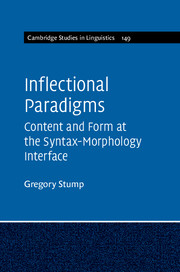Book contents
- Frontmatter
- Dedication
- Contents
- List of figures
- List of tables
- Acknowledgements
- List of abbreviations
- List of symbols and operators
- Introduction
- 1 What are inflectional paradigms?
- 2 Canonical inflectional paradigms
- 3 Morphosyntactic properties
- 4 Lexemes
- 5 Stems
- 6 Inflection classes
- 7 A conception of the relation of content to form in inflectional paradigms
- 8 Morphomic properties
- 9 Too many cells, too few cells
- 10 Syncretism
- 11 Suppletion and heteroclisis
- 12 Deponency and metaconjugation
- 13 Polyfunctionality
- 14 A theoretical synopsis and two further issues
- References
- Index
13 - Polyfunctionality
Published online by Cambridge University Press: 18 December 2015
- Frontmatter
- Dedication
- Contents
- List of figures
- List of tables
- Acknowledgements
- List of abbreviations
- List of symbols and operators
- Introduction
- 1 What are inflectional paradigms?
- 2 Canonical inflectional paradigms
- 3 Morphosyntactic properties
- 4 Lexemes
- 5 Stems
- 6 Inflection classes
- 7 A conception of the relation of content to form in inflectional paradigms
- 8 Morphomic properties
- 9 Too many cells, too few cells
- 10 Syncretism
- 11 Suppletion and heteroclisis
- 12 Deponency and metaconjugation
- 13 Polyfunctionality
- 14 A theoretical synopsis and two further issues
- References
- Index
Summary
In Section 7.2, I proposed that the canonical relation between inflected words’ content and their form possesses the five characteristics in (1). We have subsequently seen deviations from characteristics (1a–d). While a content cell's morphosyntactic property set is canonically identical with that of its form correspondent (= (1a)), instances of morphomic properties, syncretism and deponency deviate from this canonical identity. Although the form correspondents of a content paradigm's cells canonically contain the same stem (= (1b)), some instances of overabundance (those engendered by the definition of Corr) deviate from this uniformity, as do instances of true defectiveness and suppletion (including heteroclisis). Though it is canonical for cells in the content paradigms of distinct lexemes to have distinct form correspondents and hence distinct realizations (= (1c)), instances of homomorphy are deviations from this regularity. And while it is canonical for lexemes belonging to the same syntactic category to have isomorphic content paradigms (= (1d)), the phenomenon of overdifferentiation deviates from this canonical pattern.
(1) The canonical relation between content paradigms and form paradigms possesses characteristics (a)–(e).
a. Property-set preservation. Content cells and their form correspondents have the same property set; that is, for any property set σ, pm(σ) = σ.
Deviations: morphomic properties (Chapter 8), syncretism (Chapter 10), deponency (Chapter 12)
b. Stem invariance. All of a lexeme's inflected forms are based on the same stem; that is, each lexeme L has a single stem Z such that for each cell 〈L, σ〉 in L's content paradigm, Corr(〈L, σ〉) = 〈Z, σ〉.
Deviations: overabundance engendered by Corr (Section 9.1), form defectiveness (Section 9.4), suppletion and heteroclisis (Chapter 11)
c. Unambiguity. Distinct lexemes do not have identical realizations; that is, there are no two lexemes L1, L2 such that for some morphosyntactic property set σ, Corr(〈L1, σ〉) = Corr(〈L2, σ〉).
Deviation: homomorphy (Section 4.3)
d. Isomorphism of paradigms belonging to the same part of speech. Lexemes belonging to the same syntactic category have isomorphic paradigms; that is, if two lexemes L1, L2 belong to the same syntactic category, then 〈L1, σ〉 is a cell in L1's content paradigm if and only if 〈L2, σ〉 is a cell in L2's content paradigm.
Deviation: overdifferentiation (Section 9.3)
Information
- Type
- Chapter
- Information
- Inflectional ParadigmsContent and Form at the Syntax-Morphology Interface, pp. 228 - 251Publisher: Cambridge University PressPrint publication year: 2015
